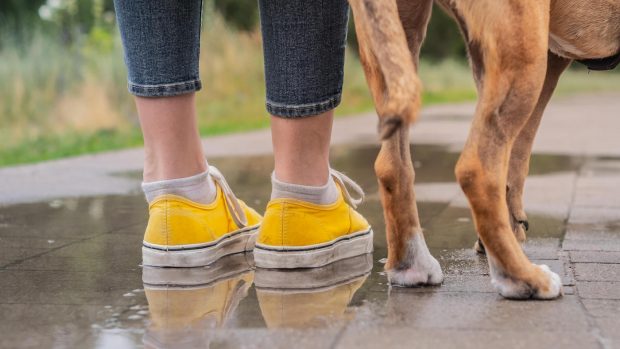The decision to buy a puppy is not one to be taken lightly. It’s all too easy to be seduced by the cutest dog breeds that abound on social media, but as the saying goes, a dog is for life, not just for Christmas. It’s a lifelong commitment and you want to start off on the best possible footing. Knowing what to look for when buying a puppy is crucial to that long-term relationship as well as canine welfare as a whole. Buying from irresponsible breeders will exacerbate issues of indiscriminate breeding, poor canine health and hereditary diseases, besides criminal activity.
Presumably, if you’ve already made the decision to get a puppy and are on the hunt, you have narrowed down the breed of dog you want to own. If you are keen to give a rescue dog a forever home, you’re probably not in the market for a puppy per se, as dogs in rescue centres tend to be older, unwanted or abandoned animals. But just because you’re plumping for a puppy doesn’t mean you start with a perfect clean slate. There are several key things to consider.
What to look for when buying a puppy
Breeder
The breeders are the first port of call. Ideally, buy from a breeder with personal recommendations. Do some research around them and ask around locally for word of mouth reassurance. If you have spotted the pups on social media, do your due diligence and find out their background. If you are not an experienced dog owner, always buy from a professional breeder with an excellent reputation – and go armed with a list of questions to ask when buying a puppy.
Good breeders will only breed from animals with excellent physical and mental attributes that have been health-screened. This is far more likely to result in a healthy, well-mannered, balanced dog in the long run.
For pedigree puppies, look at the parentage and avoid puppies whose breeding lines show close relations between family members, thereby avoiding in-breeding, which can increase the chances of genetic defects.
Visit the puppies. If you have only seen photos, the pup you are buying – and will own for the rest of its life – may not be any of those pictured in the photos. You’ll want to meet the pup’s mother at least. Any siblings and the father would be a bonus but fairly common in a breeding household. You can tell it’s the mother, and not a stand-in bitch, because she will have enlarged nipples and will still be producing milk at that stage. The mother will have instilled her own temperament and manners on her litter, so watch how she is around you, and around them. Is she friendly and docile, or are there warning signs regarding her personality?
As well as temperament, look at the mother’s and any siblings’ physical features. Does she look in proportion for her breed, or does she have any exaggerated, undesirable features that may not be apparent yet in the pups but may be inherited?
Never buy a puppy if the seller offers to meet you on neutral territory unless you know them well. You need to be able to check that the environment they have been raised in meets welfare standards, is comfortable, clean, has sufficient space and is safe. If the puppies seem unfamiliar with their surroundings, this should ring alarm bells that it may not be their real home but used as a holding bay for the sale. Another tip is to check the addresses on any documentation that they match where you are viewing the puppies.
Health
As discussed, reputable breeders will not breed from animals with physical deficiencies. Various breeds have different tests for genetic and physical health to check for the likelihood of conditions that they are most likely to suffer from, to ensure that breeding animals do not pass these characteristics on. By buying from a breeder who routinely health screens their dogs, you can be reassured that you are buying a puppy that has the best chance of a healthy life.
You should also do your own health check on seeing the pups. Are there any signs of medical problems, such as visible ribs or dull, scaly skin? Is there evidence of diarrhoea, or weakness, limping or coughing? Most of these problems will resolve, but you should get a vet to check the puppy before taking it home.
Find out the puppy’s age. Legally they cannot go to a new home until they are eight weeks of age, although some experts recommend waiting until 12 weeks for further development and socialisation in the familiarity of their first home.

Paperwork
All dogs in the UK are required by law to be microchipped by eight weeks and before they are sold. It is the breeder’s responsibility, but you should ensure that they are microchipped before taking them home. There will be paperwork to prove this, and the breeder may have a scanner or a vet can check.
A puppy’s vaccination schedule should start at around eight to 10 weeks, though some are started earlier. Check their records to make sure everything tallies and you are aware when the next vaccinations are due.
Ask for records of the puppies’ worming or parasite control schedule, which usually starts from around two weeks old and continues every two to three weeks until they are 12 weeks old.
The breeder should ask have records of any health screening tests of the parents, so ask to see these and if you are concerned about their validity, take a copy and check with your vet.
Man’s best friend
Besides ticking all the boxes of responsible breeding, correct paperwork and good health, your puppy also needs to be the right dog for you as a lifelong companion. When you visit, spend time with all the puppies, hang out with them and work out which one you are drawn to. Do the puppies explore and come up to you confidently or do they cower in a corner? Tricky characters are best left to professionals rather than novice owners.
Ask if you can take your chosen puppy to a new room or environment so you can assess how it reacts to new circumstances.
A second visit is ideal so that you can be assured that your puppy is a good fit for a long-term relationship and all the responsibility that goes with owning a dog.
Good luck. The arrival of a new puppy marks the start of one of the most enriching and rewarding adventures in life!
You may also enjoy reading…

28 questions to ask when buying a puppy

100 girls’ dog names for bitches

100 boys’ names for your new male pup

Puppy fear periods: why is my puppy suddenly scared?

Best wet puppy foods for satisfaction, healthy development and happy mealtimes

What to feed a puppy for healthy growth

How to house train with puppy pads, according to an expert dog trainer

Sleep tight little one! Best puppy beds for sweet slumber

Subscribe to Horse & Hound magazine today – and enjoy unlimited website access all year round
Horse & Hound magazine, out every Thursday, is packed with all the latest news and reports, as well as interviews, specials, nostalgia, vet and training advice. Find how you can enjoy the magazine delivered to your door every week, plus options to upgrade your subscription to access our online service that brings you breaking news and reports as well as other benefits.




